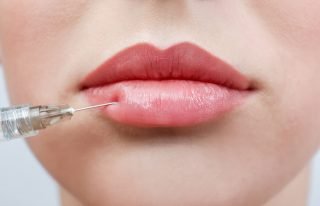What is beauty? The standards of beauty and skin change but unfortunately, this often does as much harm as good. Not too long ago, the acceptable beauty was being needle thin. This led to eating disorders and girls with shapes hating themselves for not being able to find a pair of jeans that hugged their curves. Now we’re living in a time when curves are in. However, it has to be the right kind of curves. Thus, those who don’t have the right kind of curves either begin to hate their bodies – or they tried to buy a new one.
This mentality was heavily present before the pandemic, so it’s no surprise that eating disorders and body dysmorphia have basically skyrocketed in the past few months. That said, what role do estheticians and plastic surgeons play when it comes to addressing these serious issues? Do they have a responsibility?
COVID-19 and Body Dysmorphia
The growth of ZOOM Dysmorphia
Throughout the pandemic, we’ve all been spending more time on ZOOM than previously normal. Unfortunately, as convenient as this is, it’s also led to a rise in a phenomenon known as zoom dysmorphia. With us spending so much time looking into a camera, we’ve now developed a heightened awareness of our own appearance and a lot of us don’t really like what we see.

Photo by Chris Montgomery on Unsplash
Now with aesthetic clinics open, many are turning to them in order to fix the issues ZOOM has shown them. However, if a patient is clearly struggling with zoom dysmorphia, how does an aesthetician address the issue?
“Aesthetic practitioners are currently not required to screen for social dysmorphia. It is a relatively new phenomenon brought on by the increased usage of screens and video calls due to the pandemic.” explains Dr. Zama Thladi, a medical doctor and board-certified aesthetician practitioner, “A medical aesthetician would recommend a psychological evaluation that assesses risk factors and thoughts, feelings, and behaviors related to negative self-image if a true case was suspected.”
Too much lip?
We’ve all noticed the rise in daffy-duck-like lip fillers. In fact, it’s become such a growing concern that both patients and doctors are encouraged to both properly guard against abusing the procedure.
“The utmost care has to be given to the prevention of infections and the injection technique has to be perfect. Lumps and bumps occur in the lips when an unsuitable filler is injected superficially or in the wrong location”, explains Dr, Thladi. She adds that too much lip can result in long-term damage including stretching of the skin, excessive wrinkling of the lip, and some adverse degree of irregularity in the skin around the mouth.

Africa Studio/Shutterstock
“The worst complications from dermal filler injections can even be disastrous. The injection of a dermal filler into a blood vessel can lead to necrosis (death of surrounding tissue) and even blindness.”
Do you see any wrinkles?
What’s more, lip fillers aren’t the only area where patients may overdo it. From cat-like faces to faces that don’t move, getting too much Botox has also become quite the norm.
“Clients often seek botulinum toxin (aka Botox) injections frequently and may seek to do the injections too soon after a consultation. We recommend a 4-6 month period between injection consults. However, as the level of botulinum toxin drops, clients try to insist on doing fresh injections in order to have fewer wrinkles, even though there may be adverse side effects.” explains Dr. Tladi, “This can be a difficult road to navigate as you need to guide clients and take in new business, yet remain ethical at all times.”
The issue is skin deep
We would never dissuade anyone from getting cosmetic treatment. However, it’s important to remember that cosmetic surgery does very little to alleviate mental health concerns. According to a study published in the Annals of Plastic Surgery, only two percent of cosmetic surgeries reduce the severity of body dysmorphia.

LovelyColorPhoto/Shutterstock
Dr. Tladi says, “Aesthetic procedures cannot solve the underlying psychological problem and tend to leave the majority of sufferers worse off. They often find the outcome unsatisfactory, even if the practitioner sees the treatment as successful with good results.”
She goes on to say that this will inevitably lead to requests for more treatments, followed by increasing frustration on behalf of both the patient and the practitioner. It may be tempting to keep charging lucrative amounts, but ultimately no treatment could ‘fix’ or satisfy a sufferer.
How can I anti-age, naturally?
Eat well
According to Dr. Tladi, oftentimes clients are completely unaware that their poor diet is affecting their skin adversely and accelerating the aging process.

Photo by Ola Mishchenko on Unsplash
“Eating plenty of fruits and vegetables rich in antioxidants is good for the entire body, including the skin. Antioxidants such as beta-carotene and vitamins C, E, and A, which are found in fruits and vegetables, can curb the damage caused by unstable molecules known as free radicals. These molecules can harm skin cells and cause signs of aging in the skin.” explains Dr. Tladi. She also recommends supplements such as collagen and Omega 3s for improved skin health and aesthetics.
Additional ways you can anti-age your skin include getting more exercise, wearing sunscreen, and managing your stress levels. You could even go into DNA testing and have the results reveal your skin’s triggers and how to avoid them.
“I am not an expert in DNA testing. However, I do think that it is valuable, especially for individuals with a family history of a chronic or dread disease.” shares Dr. Tladi.



 Dr. Zama Tladi has dedicated her practice to helping clients with African skin to look great and feel more confident. A medical doctor, Zama is the founder and chief aesthetician practitioner of
Dr. Zama Tladi has dedicated her practice to helping clients with African skin to look great and feel more confident. A medical doctor, Zama is the founder and chief aesthetician practitioner of 

![women [longevity live]](https://longevitylive.com/wp-content/uploads/2020/01/photo-of-women-walking-down-the-street-1116984-100x100.jpg)










